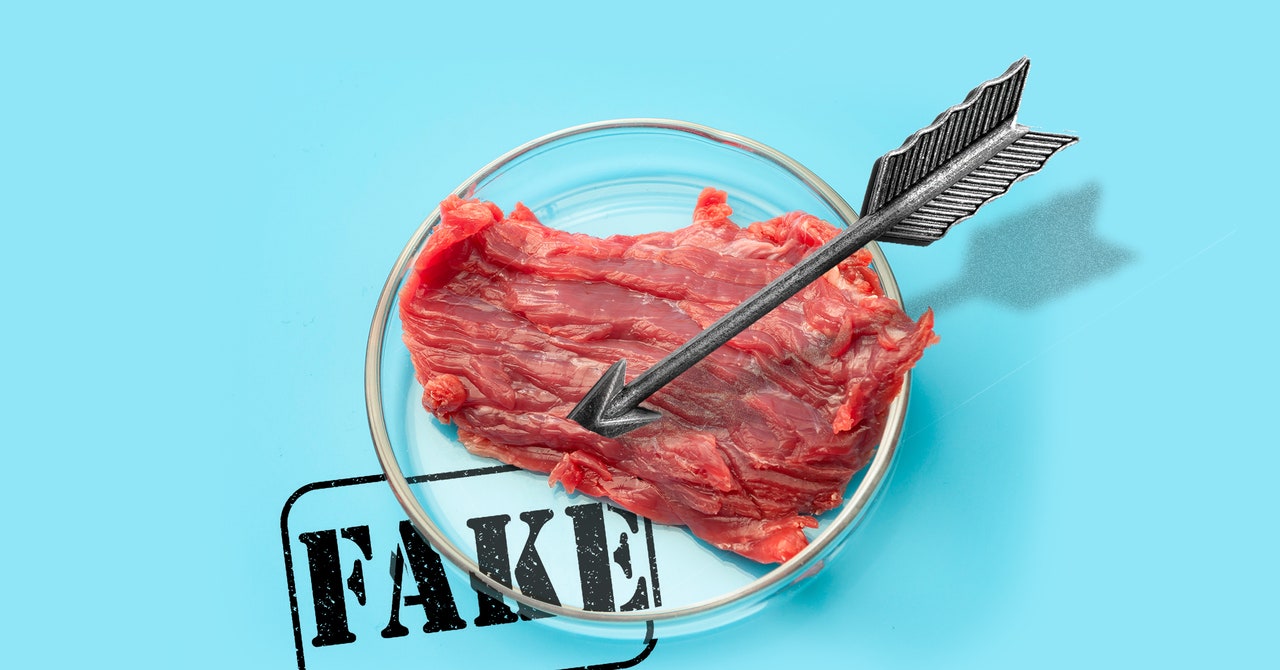Around 46 million Americans live in states that have introduced bills to ban cultivated meat, the latest escalation in a surprising culture war.
Unless Florida governor Ron DeSantis has an unexpected change of heart, it will soon be a crime to sell or make cultivated meat in the Sunshine State. A bill passed by the Florida House and Senate is now awaiting the signature of DeSantis, who has already indicated his opposition to what he calls “fake meat.” If he does sign the bill into law, anyone who sells, makes, or distributes cultivated meat in Florida may be subject to a fine of up to $500 and 60 days in prison.
“Beating somebody up and selling cultivated meat are the same in the eyes of the law in Florida,” says Justin Kolbeck, CEO of cultivated seafood startup Wildtype, who has been trying to persuade legislators to ease up on a number of proposed bans. As well as the Florida bill, there is also proposed legislation to ban cultivated meat in Alabama, Arizona, Kentucky, and Tennessee. If all of those bills pass—an admittedly unlikely prospect—then some 46 million Americans will be cut off from accessing a form of meat that many hope will be significantly kinder to the planet and animals.
The wave of proposed legislation, including very strict labeling laws, may come as a surprise given that cultivated meat isn’t on sale anywhere in the US at the moment. Floridians were already very unlikely to get their hands on a cultivated chicken cutlet, but the proposed ban shuts off that option altogether. “It is really significant. And to prohibit a food before it’s on the market for that whole population, before they’ve had a chance to try it and see if they want to buy it, feels absurd,” says Jessica Almy, senior vice president of policy at the Good Food Institute, a nonprofit that lobbies for alternatives to animal protein.
[Meta comment]
This has nothing to do with this article, but I just want to express my appreciation for your contributions. You consistently post high quality articles (never anything MBFC deems low credibility) on a variety of topics. When something slips through that’s already been posted, you’re quick to delete it which helps de-clutter the feed. I’ve also never sensed any agenda from you, and you’re just here making the community great.
So, thanks!
You just made my day. Thanks @[email protected]!
I agree, I see your posts all the time, and I really appreciate you taking the time to post great stuff.
And I appreciate your kind words!
Good quality articles with real summaries. Niiice!
If you’re like me and wanted to know why Desantis opposes lab-grown meat… it’s literally a political stunt. He gives no justification. What a putz.
https://fox59.com/news/national-world/ron-desantis-has-beef-with-lab-grown-meat/amp/
yay, another article that uses the term “slammed”
It’s just more war on innovation to keep the status quo. The farmers grow the crops with government subsidy to feed the cattle to sell the beef to restaurants to fatten more people up and further prop up private healthcare and pharma subscription treatments (wegovy anyone?)
Heaven forbid anything change. It’s important that big farm gets their subsidies and that americans use animal suffering for their profit because that’s the way it’s always been.
It’s pure unadulterated anti-wokery.
What can I do that will anger the left.
Conservatives are bad and should be removed from power.
Wow, you said that so much nicer than I do.
I’ve had a few “Removed by moderator” moments that lead me to tone it down slightly.
Great campaign slogan right here
Instead of lab grown meat they want meat grown in the most deplorable conditions with 14 year olds working there.
You forgot to add “where they get all the profits.” It’s the exact same play that big oil used to slow down the roll out of renewables and EVs.
“New thing bad, our thing good, new thing unamerican, our thing patriotic, new thing poison, our thing delicious”
-meat companies probably
Leave it to the shithole states to stand in the way of progress and conservation
Inflicting pain and suffering onto any being that is not them is the point with Republicans.
Explains why they don’t want the lab-grown stuff. Upside, maybe if we grow brains for the meat so it can suffer they’ll let it go back on sale. Then we can grow brains for the Republicans too, and shortly thereafter we won’t have any more Republicans.
All the shitty states.
Yeah. Every time I see an article like this where a bunch of states are being authoritarian shit holes I check and an always relieved my state isn’t included.
My birth state is usually on the list but fortunately not usually as early or as draconian as the others while still being terrible. Florida, Texas Alabama, Louisiana, Missouri, Tennessee, and at least one the Carolina’s are usually the most crazy in that order. Praise the gods for Atlanta
What a bunch of corrupt fucking demagogues 🤬
Woohoo freedom and small government
If it doesn’t cause a level of pain and psychological torment to an animal that would drive a human to suicide, it ain’t real meat
One second, let me try to recreate Ron “I lost a presidential bid to an orangutan” Desantis’s thought process:
Inhale
WE HAVE TO BAN FAKE MEAT BECAUSE ITS MADE BY LIBERAL WOKE COMMUNIST SCIENTISTS THAT WILL LACE IT WITH TRANSGENDERISM AND TURN OUR KIDS GAY OUR REAL AMERICAN KIDS SHOULD ONLY EAT REAL AMERICAN MEAT
Now if you’ll excuse me, I’m going to go disinfect my mouth
REAL AMERICAN KIDS SHOULD ONLY EAT REAL AMERICAN MEAT
Rule? No homo? That’s what she said?
What’re we doing these days?
Phrasing?
When did we slip into unreality?
I think it was when all those clown sightings happened in 2016
Once they took over the White House it was checkmate
Free market conservatives. /s
States Are Lining Up to Outlaw Lab-Grown Meat Matt Reynolds 8 - 10 minutes
Unless Florida governor Ron DeSantis has an unexpected change of heart, it will soon be a crime to sell or make cultivated meat in the Sunshine State. A bill passed by the Florida House and Senate is now awaiting the signature of DeSantis, who has already indicated his opposition to what he calls “fake meat.” If he does sign the bill into law, anyone who sells, makes, or distributes cultivated meat in Florida may be subject to a fine of up to $500 and 60 days in prison.
“Beating somebody up and selling cultivated meat are the same in the eyes of the law in Florida,” says Justin Kolbeck, CEO of cultivated seafood startup Wildtype, who has been trying to persuade legislators to ease up on a number of proposed bans. As well as the Florida bill, there is also proposed legislation to ban cultivated meat in Alabama, Arizona, Kentucky, and Tennessee. If all of those bills pass—an admittedly unlikely prospect—then some 46 million Americans will be cut off from accessing a form of meat that many hope will be significantly kinder to the planet and animals.
The wave of proposed legislation, including very strict labeling laws, may come as a surprise given that cultivated meat isn’t on sale anywhere in the US at the moment. Floridians were already very unlikely to get their hands on a cultivated chicken cutlet, but the proposed ban shuts off that option altogether. “It is really significant. And to prohibit a food before it’s on the market for that whole population, before they’ve had a chance to try it and see if they want to buy it, feels absurd,” says Jessica Almy, senior vice president of policy at the Good Food Institute, a nonprofit that lobbies for alternatives to animal protein.
Almy says that there may be legal grounds to challenge the Florida ban, although it is not clear whether the bill will be brought before courts if it becomes law. In a letter, the North American Meat Institute (NAMI), a trade body representing meat companies, opposed the ban, saying that it conflicts with federal law and is “bad public policy that would restrict consumer choice and stifle innovation.”
The proposed bans raise questions about possible tensions between the conventional meat industry and the cultivated meat industry. Although NAMI opposes the Florida ban, the text of a proposed ban in Arizona and a failed ban proposed in West Virginia both position cultured meat as a threat to the cattle ranching industry in each state. In the Florida House, Representative Dean Black, a cattle rancher, was vociferous in his opposition to cultivated meat. “Me and my Earthling friends will eat real meat here on Earth, and let us reserve this fantastical meat to outer space,” he said in a speech that was greeted with whoops and cheers from legislators. The bill—which included a much wider set of reforms, including to electric vehicle charging—passed the House with 86 votes in favor and 27 against.
Representative Anna Eskamani, who voted against the bill on March 6, argues that it was an example of corporate capture designed to protect an industry that was “losing its footprint.” “And instead of acknowledging that, you’re going to stop a new footprint from appearing. It’s very protectionist, it’s anti free-market, and at the end of the day, it’s also allowing a monopoly to continue,” she says.
The pushback from legislators sympathetic to ranchers and the broader meat industry puts cultivated meat companies in a difficult situation. Major meat producers Cargill and Tyson have both invested in cultivated meat companies, while Brazil’s JBS is working on a cultivated research site in Brazil. “We see ourselves as an ‘and’ solution, not an ‘or.’ We’re never looking to replace conventional [meat],” says Sean Edgett, chief legal officer at Upside Foods, a cultivated meat startup which counts Cargill and Tyson among its investors. “We think there’s always going to be a place for it on the market. So as I look at these bills, they seem very protectionist.”
Wildtype cofounders Justin Kolbeck and Ayré Elfenbein have visited legislators in Arizona, Alabama, and Florida to try to persuade them to vote down or amend proposed legislation in those states. “The shift we’re seeing is toward something that is far more extreme, which is talking about outright bans,” says Elfenbein. The cofounders are particularly keen on a carve-out for cultivated seafood, pointing out to legislators that the US is a net importer of seafood and that a new source of fish would improve food security within the country.
Also worrying for cultivated meat companies are a number of proposed bills that would impose new labeling restrictions. A proposed bill in Arizona would prevent companies from using meaty terms to describe products made from cultivated meat, plants, or insects. A similar bill in West Virginia that passed in March requires any cultivated meat product to be labeled as “cell-cultured,” “lab-grown,” or a similar term. The fact that legislators are proposing legislation that lumps cultivated meat together with insect meat—a category that many would-be consumers find gross—is a worrying sign, Almy says.
A political backlash against cultivated meat isn’t surprising, says Sparsha Saha, a lecturer on meat and politics at Harvard’s Department of Government. “I think it was always going to be political fodder, because you have conglomerates, you have a very powerful and increasingly integrated meat and dairy sector,” she says.
In Florida, the debate was particularly extreme. On the House floor, representative Dean Black called cultured meat a “bacterial culture” and “nitrogen-based cellular protein paste.” Representative Daniel Alvarez compared the cells found in cultured meat to cancer.
Such arguments are extremely misinformed, says Elfenbein. “A lot of the arguments that were made were made under the false pretense of safety,” he says. On X, Florida’s agricultural commissioner has compared the Food and Drug Administration’s conclusion that cultured meat from two US companies is safe to eat to mask mandates. “It’s inherently a political war,” says Saha.
Behind closed doors, lawmakers strike a more balanced tone, says Edgett. “Our conversations with all these lawmakers in their offices are very different to what they are on the floor,” he says. Upside Foods has released a blog post urging prospective customers to ask Governor DeSantis to veto the bill.
Resistance from lawmakers to cultured meat is also bubbling in Europe. In November, the Italian parliament approved a ban on the food, which is not currently available to customers anywhere in Europe. It is not clear, however, whether the Italian law will stand, as it may violate a European Union directive designed to stop regulatory barriers within the bloc. In a meeting of the EU Agriculture and Fisheries Council on January 23, a number of delegates called for “a renewed and broad debate in the EU specific to lab-grown meat.”
“The kind of laws popping up in the US and EU appear to be largely political theater but have the potential to negatively impact research, at the very least within those regions,” says Dwayne Holmes, director of research and innovation (EU) at the cultured meat research nonprofit New Harvest. “These laws are also arguably the unintended byproduct of a race-to-market hype cycle designed to create excitement, which in practice can cut both ways.”
The prospect of more state-level proposed bans lurks in the background. A proposed ban in West Virginia was introduced this year but is no longer an active bill. In 2023, Texas legislators brought a proposed ban that didn’t make it into law. “I wouldn’t be surprised to see that bill pop up again,” says Almy. Her hope, though, is that if a similar bill rears its head, legislators will have heard enough from nonprofits like the GFI and cultivated meat startups that they don’t take the same route as Florida. Cultivated meat might be approved for sale in the US, but the race to convince legislators to accept it is only just beginning.
Once lab grown meat becomes 50% the cost of real meat, and their constituents can’t get it in their own state, you’ll see them change their tune
So will this effect imitation foods already on the market? Supermarket sushi will have to go the way of the dodo.
Depends how woke those products are. If it’s just to sell cheap imitation products it’s okay, but if it’s to help reduce agricultural impact or reduce animal suffering then it’s a criminal offense











